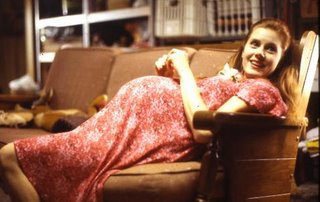
Junebug Junebug is the best film of 2005 you probably didn’t see. This “small” film chronicles George (Alessandro Nivola) visiting his parents in his hometown because he and his new, very cosmopolitan wife Madeleine (Embeth Davidtz) are in the area trying to secure a local painter’s cooperation for her gallery. While My Cousin Vinny works because it makes fun of everybody, both the small town Southerners and the city slickers, Junebug works because none of the characters is just a stereotype, and no easy answers are given. It’s a small coup that Ben McKenzie’s participation in the film as Johnny will draw in many an eager O.C. fan who will be dumbfounded both by the film and his loutish character, a young man who can only lash out at the world around him... although in one brilliant scene, writer Angus MacLachlan and director Phil Morrison change how we look at him. The heart and soul of this film, however, is the luminous, effervescent Amy Adams as a very pregnant, always optimistic chatterbox. While at first she comes off as a little annoying perhaps, she is so guileless, so sincere, and so upbeat she becomes captivating, and when she faces highs and some significant lows you will care for her deeply. Unless you know you hate this sort of small indie movie, check it out, because it really is a tiny gem.
 A History of Violence Just as Clint Eastwood’s role in Mystic River gave that film’s exploration into the consequences of violence added weight, this foray into similar territory gains significance because veteran splatter-meister David Cronenberg is at the helm. At several points, he constructs a violent episode we will initially cheer, only to be disgusted a minute later by the result. The two sex scenes are both memorable, but the first one is playful while the second is disturbing. Viggo Mortensen, Mario Bello, and Ed Harris all deliver captivating performances in this straight-forward, fast-moving but never entirely predictable film. The ending provides a perfect cap for a film that constantly makes us wonder what’s going to happen next. (You can hear David Cronenberg on The Treatment here.)
A History of Violence Just as Clint Eastwood’s role in Mystic River gave that film’s exploration into the consequences of violence added weight, this foray into similar territory gains significance because veteran splatter-meister David Cronenberg is at the helm. At several points, he constructs a violent episode we will initially cheer, only to be disgusted a minute later by the result. The two sex scenes are both memorable, but the first one is playful while the second is disturbing. Viggo Mortensen, Mario Bello, and Ed Harris all deliver captivating performances in this straight-forward, fast-moving but never entirely predictable film. The ending provides a perfect cap for a film that constantly makes us wonder what’s going to happen next. (You can hear David Cronenberg on The Treatment here.)  The Constant Gardener Director Fernando Mereilles (City of God) proved an inspired choice to helm this John LeCarre adaptation. Featuring two of my favorite actors, Ralph Fiennes and Rachel Weisz, Gardener suffers from the fact that its dread political "secret" is all too easy to guess and sadly, all too easy to believe. Realizing this, Mereilles wisely shifts the focus from the "what" to the "how" and "who." The Brazilian Mereilles moves easily through the crowds of Africa and seems to take a special delight in following the politically active Tessa (Weisz) during her various interactions. The love-making scenes, too, have a playful, intimate feel to them, with Mereilles’ handheld, freeform style the perfect approach for the disarmingly natural performances of Fiennes and Weisz. Most of the film, however, centers on Justin (Fiennes) pursuing the truth about who killed his wife Tessa, why, and who she really was. Danny Huston's British accent is shaky, but perhaps it adds to his slimy manner (I had not realized that he was director John Huston's son). Bill Nighy, who can play amiable goofballs well, delivers a chilling portrait here of a high government official. As Justin rouses from his polite routines of gardening, moving deeper and deeper into the world of Tessa’s political activism, he discovers new aspects to the woman he loved, and himself. It’s the little disappointments, small surprises, and real poignancies of their relationship that give this film its ultimate grace and beauty. (You can hear Fernando Meirelles on The Treatment here.)
The Constant Gardener Director Fernando Mereilles (City of God) proved an inspired choice to helm this John LeCarre adaptation. Featuring two of my favorite actors, Ralph Fiennes and Rachel Weisz, Gardener suffers from the fact that its dread political "secret" is all too easy to guess and sadly, all too easy to believe. Realizing this, Mereilles wisely shifts the focus from the "what" to the "how" and "who." The Brazilian Mereilles moves easily through the crowds of Africa and seems to take a special delight in following the politically active Tessa (Weisz) during her various interactions. The love-making scenes, too, have a playful, intimate feel to them, with Mereilles’ handheld, freeform style the perfect approach for the disarmingly natural performances of Fiennes and Weisz. Most of the film, however, centers on Justin (Fiennes) pursuing the truth about who killed his wife Tessa, why, and who she really was. Danny Huston's British accent is shaky, but perhaps it adds to his slimy manner (I had not realized that he was director John Huston's son). Bill Nighy, who can play amiable goofballs well, delivers a chilling portrait here of a high government official. As Justin rouses from his polite routines of gardening, moving deeper and deeper into the world of Tessa’s political activism, he discovers new aspects to the woman he loved, and himself. It’s the little disappointments, small surprises, and real poignancies of their relationship that give this film its ultimate grace and beauty. (You can hear Fernando Meirelles on The Treatment here.)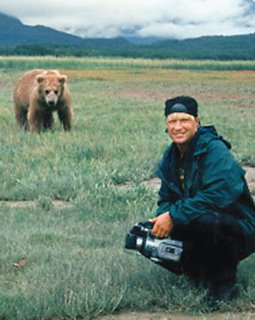 Grizzly Man Werner Herzog films always produces an interesting film, but at his best he's a wonder. Grizzly Man is one of his best documentaries in years, as he culls together footage shot by Timothy Treadwell, who lived among grizzly bears in Alaska every summer for about eight years until he and his girlfriend were attacked and devoured by one. Herzog is right to say that Treadwell sentimentalizes the bears and nature, but Treadwell is so passionate and dedicated, and so dirt poor, it's impossible not to admire him at least a little. Much of the nature footage itself is captivating, but Herzog also shows enormous restraint and respect towards the material.
Grizzly Man Werner Herzog films always produces an interesting film, but at his best he's a wonder. Grizzly Man is one of his best documentaries in years, as he culls together footage shot by Timothy Treadwell, who lived among grizzly bears in Alaska every summer for about eight years until he and his girlfriend were attacked and devoured by one. Herzog is right to say that Treadwell sentimentalizes the bears and nature, but Treadwell is so passionate and dedicated, and so dirt poor, it's impossible not to admire him at least a little. Much of the nature footage itself is captivating, but Herzog also shows enormous restraint and respect towards the material. 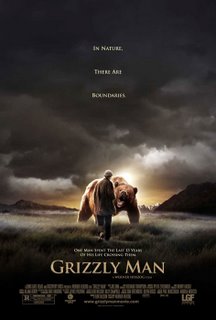 Rather than playing the audio of Treadwell and his girlfriend being killed (the camera was rolling but the lens cap was on), Herzog films himself listening to the tape with headphones on while Treadwell's friend/former girlfriend watches his reaction. He tells her to never listen to the tape, and to destroy it. While at the start of the film we may have had some interest in hearing it ourselves, by that point we realize Herzog's exactly right. Grizzly Man explores the boundaries between nature and humanity, and Treadwell's attempts to cross those boundaries do indeed help define what it means to be human. (Read a Washington Post article on Herzog and the film here.)
Rather than playing the audio of Treadwell and his girlfriend being killed (the camera was rolling but the lens cap was on), Herzog films himself listening to the tape with headphones on while Treadwell's friend/former girlfriend watches his reaction. He tells her to never listen to the tape, and to destroy it. While at the start of the film we may have had some interest in hearing it ourselves, by that point we realize Herzog's exactly right. Grizzly Man explores the boundaries between nature and humanity, and Treadwell's attempts to cross those boundaries do indeed help define what it means to be human. (Read a Washington Post article on Herzog and the film here.)  Batman Begins Superman was the first superhero film for adults, even if parts of it were interminable, and Superman 2 was fun. Both X-Men films were quite good, and the Spiderman series set a new, high standard for the genre. But Batman Begins ups the ante once again. Of all the would-be blockbusters of 2005, none came close to the marriage of character depth and adventure of Batman Begins. Director Christopher Nolan and Christian Bale laughed on Charlie Rose about what an astonishing coup it was that two relative unknowns were being given the keys to the kingdom, but as with Lord of the Rings and Spiderman, boy did it pay off. This engaging origin story draws from much of the best comic book work of Frank Miller and others, and it’s well envisioned for the screen, with many wry and funny touches added in (as when Wayne devises a novel means to evacuate a large party from his mansion). All the performances are good, but Bale’s performance as Bruce Wayne and Batman captures the intelligence, pain, and obsessive nature of the character splendidly. His relationships with Alfred (Michael Caine), Rachel (Katie Holmes) and Ducard (Liam Neeson) are also particularly strong. Despite their small screen time, Cillian Muphy and the astonishingly versatile Tom Wilkerson have vivid turns, and Gary Oldman gives such a subdued, subtle performance as honest cop Gordon he’s hard to recognize at first. This is how it’s supposed to be done, folks, and damn, is it fun to watch. The lesson to the studios is, yet again: hire a good fanboy director, set him or her up with a good writer and a good producer to rein in any excesses, and then leave them the hell alone. The result, as with Lord of the Rings and Spiderman, is very likely both a great film and a commercial success. (You can hear Christopher Nolan on The Treatment here.)
Batman Begins Superman was the first superhero film for adults, even if parts of it were interminable, and Superman 2 was fun. Both X-Men films were quite good, and the Spiderman series set a new, high standard for the genre. But Batman Begins ups the ante once again. Of all the would-be blockbusters of 2005, none came close to the marriage of character depth and adventure of Batman Begins. Director Christopher Nolan and Christian Bale laughed on Charlie Rose about what an astonishing coup it was that two relative unknowns were being given the keys to the kingdom, but as with Lord of the Rings and Spiderman, boy did it pay off. This engaging origin story draws from much of the best comic book work of Frank Miller and others, and it’s well envisioned for the screen, with many wry and funny touches added in (as when Wayne devises a novel means to evacuate a large party from his mansion). All the performances are good, but Bale’s performance as Bruce Wayne and Batman captures the intelligence, pain, and obsessive nature of the character splendidly. His relationships with Alfred (Michael Caine), Rachel (Katie Holmes) and Ducard (Liam Neeson) are also particularly strong. Despite their small screen time, Cillian Muphy and the astonishingly versatile Tom Wilkerson have vivid turns, and Gary Oldman gives such a subdued, subtle performance as honest cop Gordon he’s hard to recognize at first. This is how it’s supposed to be done, folks, and damn, is it fun to watch. The lesson to the studios is, yet again: hire a good fanboy director, set him or her up with a good writer and a good producer to rein in any excesses, and then leave them the hell alone. The result, as with Lord of the Rings and Spiderman, is very likely both a great film and a commercial success. (You can hear Christopher Nolan on The Treatment here.) 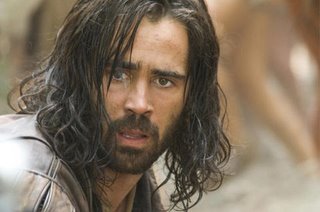 The New World Terrence Malick’s films are not for all tastes, as he tends to eschew a driving narrative in favor of a cinematic tone poem full of visual lyricism. It’s Art House Cinema with a capital “A,” but as with The Thin Red Line, I find myself all too willing to go along for the ride. Malick always has his excesses, and I would have preferred a closer eye towards the story, but he does what he does so very beautifully I find it hard to complain. The love story between John Smith and the unnamed Pocahontas (played guilelessly in a remarkable film debut by Q'Orianka Kilcher) is evocative, moving, and real.
The New World Terrence Malick’s films are not for all tastes, as he tends to eschew a driving narrative in favor of a cinematic tone poem full of visual lyricism. It’s Art House Cinema with a capital “A,” but as with The Thin Red Line, I find myself all too willing to go along for the ride. Malick always has his excesses, and I would have preferred a closer eye towards the story, but he does what he does so very beautifully I find it hard to complain. The love story between John Smith and the unnamed Pocahontas (played guilelessly in a remarkable film debut by Q'Orianka Kilcher) is evocative, moving, and real.  Malick uses Wagner’s music from Das Rheingold to powerful effect as the Europeans first discover the New World, and more than any filmmaker before, he gives us a glimpse at what the ”naturals” must think of these interlopers. We feel the newness of this new world from both perspectives, and Malick gives us a glimpse at what it may have been like, or at least makes us wonder. In the end, The New World owes more to Herzog’s Aguirre than any Hollywood period film; you will not find the action or more direct romance of Michael Mann’s Last of the Mohicans here. The natural world is as much a character in the film as any of the people. While Malick may be too easily distracted by the way the light plays upon a leaf in the woods as John Smith and Pocahontas feel each others’ faces and speak in overlapping voiceover whispers, that is surely part of the point. Avoid this film or seek it out according to your tastes.
Malick uses Wagner’s music from Das Rheingold to powerful effect as the Europeans first discover the New World, and more than any filmmaker before, he gives us a glimpse at what the ”naturals” must think of these interlopers. We feel the newness of this new world from both perspectives, and Malick gives us a glimpse at what it may have been like, or at least makes us wonder. In the end, The New World owes more to Herzog’s Aguirre than any Hollywood period film; you will not find the action or more direct romance of Michael Mann’s Last of the Mohicans here. The natural world is as much a character in the film as any of the people. While Malick may be too easily distracted by the way the light plays upon a leaf in the woods as John Smith and Pocahontas feel each others’ faces and speak in overlapping voiceover whispers, that is surely part of the point. Avoid this film or seek it out according to your tastes. 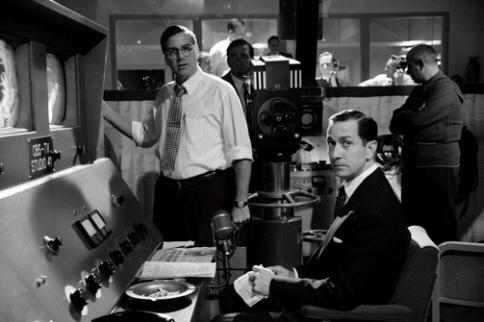 Good Night, and Good Luck I’ve covered this film earlier here and here. This is a very good film, but it is not superb, even though it deals with issues very dear to my heart and is all too relevant. David Strathairn delivers a spot-on performance as Edward R. Murrow (like his fellow members from the John Sayles Players, Chris Cooper and Joe Morton, Strathairn is always superb). However, Murrow is also a cerebral, reserved hero, and nothing really is on the line for him. He lacks the fire and stakes that Jimmy Stewart has in Mr. Smith Goes to Washington. While Murrow does deserve credit for taking on McCarthy, he was neither the first nor the last, and McCarthy’s real showdown and downfall came with the Army hearings (to my understanding), highlighted by the famous line, “Have you no decency?” Many critics have pointed out that the Robert Downey- Patricia Clarkson hidden marriage subplot is pretty extraneous — the message seems to be, one should have the courage to reveal one’s self. So — it’s a worthy and timely film, well worth seeing, but not an indisputable classic.
Good Night, and Good Luck I’ve covered this film earlier here and here. This is a very good film, but it is not superb, even though it deals with issues very dear to my heart and is all too relevant. David Strathairn delivers a spot-on performance as Edward R. Murrow (like his fellow members from the John Sayles Players, Chris Cooper and Joe Morton, Strathairn is always superb). However, Murrow is also a cerebral, reserved hero, and nothing really is on the line for him. He lacks the fire and stakes that Jimmy Stewart has in Mr. Smith Goes to Washington. While Murrow does deserve credit for taking on McCarthy, he was neither the first nor the last, and McCarthy’s real showdown and downfall came with the Army hearings (to my understanding), highlighted by the famous line, “Have you no decency?” Many critics have pointed out that the Robert Downey- Patricia Clarkson hidden marriage subplot is pretty extraneous — the message seems to be, one should have the courage to reveal one’s self. So — it’s a worthy and timely film, well worth seeing, but not an indisputable classic.  Wallace and Gromit: The Curse of the Were-Rabbit How can you go wrong with Nick Park’s latest, especially when it involves Wallace, Gromit, and a Were-Rabbit? You can’t. Like Pixar, Nick Park seemingly can do no wrong, and manages to make films that are a constant delight by providing: characters with recognizable, endearing foibles, a clear if silly storyline, and much gentle whimsy swirling about some truly enchanting moments.
Wallace and Gromit: The Curse of the Were-Rabbit How can you go wrong with Nick Park’s latest, especially when it involves Wallace, Gromit, and a Were-Rabbit? You can’t. Like Pixar, Nick Park seemingly can do no wrong, and manages to make films that are a constant delight by providing: characters with recognizable, endearing foibles, a clear if silly storyline, and much gentle whimsy swirling about some truly enchanting moments.

No comments:
Post a Comment
Comments go into moderation for posts older than 30 days.